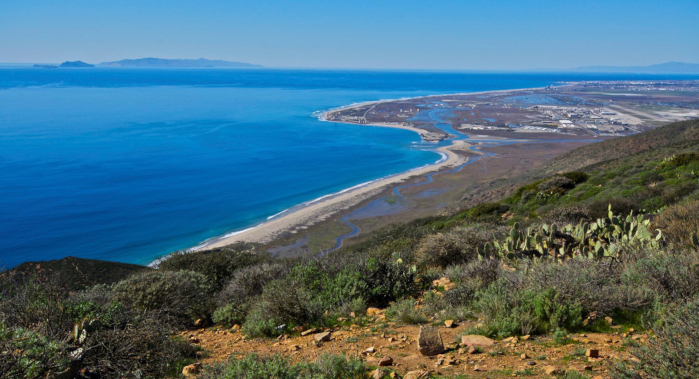The California Current is one of only four temperate upwelling systems in the world. Seasonal upwelling of nutrient-rich waters fuels a highly productive ecosystem, supporting biodiversity and fisheries that, along with coastal tourism, are a foundation of California’s economy.
Yet California’s coasts and oceans are also under increasing threat. Relatively few fisheries are managed based on robust scientific assessments, and more needs to be done to avoid overfishing and reduce bycatch. Plastics and other pollutants are pervasive. Climate change compounds these challenges. Ocean chemistry is changing. Sea levels and temperatures are rising – threatening important resources, biodiversity, and human populations.
Fortunately, the coastal and ocean ecosystems of California are bolstered by a network of marine protected areas and some of the most science-based marine policies in the world. Conservancy scientists look to build on those foundations by applying science and technology to enhance resilience of marine resources in the face of emerging threats.




UC Santa Cruz (Austen E. Stovall, Michael W. Beck), The Nature Conservancy (Alyssa Mann, Tamaki Bieri), Radbridge/formerly Earth Economics (Johnny Mojica, Rowan Schmidt)
Climate change poses severe threats to coastal communities and the ecosystems on which they depend. Warming ocean temperatures increase the magnitude and frequency of storm and coral bleaching events,…Heather Tallis, Joe Fargione, Edward Game, Rob McDonald, Leandro Baumgarten, Nirmal Bhagabati, Rane Cortez, Bronson Griscom, Jonathan Higgins, Christina M. Kennedy, Joe Kiesecker, Timm Kroeger, Trina Leberer, Jennifer McGowan, Lisa Mandle, Yuta J. Masuda, Scott Morrison, Sally Palmer, Rebecca Shirer, Priya Shyamsundar, Nicholas H.Wolff, and Hugh P. Possingham
Spatial analysis is a powerful tool in conservation planning. Yet it is often under-deployed as a means of elucidating which conservation actions may deliver the highest return on investment. This…James A. Fitzsimons, Simon Branigan, Chris L. Gillies, Robert D. Brumbaugh, Jun Cheng, Bryan M. DeAngelis, Laura Geselbracht, Boze Hancock, Andrew Jeffs, Tein McDonald, Ian M.McLeod, Bernadette Pogoda, Seth J. Theuerkauf, Marine Thomas, Stephanie Westby, Philine S.E. zu Ermgassen
Widespread global declines in shellfish reefs have led to growing interest in their restoration and protection. With restoration projects now occurring on four continents and in at least seven…Philine S. E. zu Ermgassen, Ruth H. Thurstan, Jorge Corrales, Heidi Alleway, Alvar Carranza, Norbert Dankers, Bryan DeAngelis, Boze Hancock, Flora Kent, Ian McLeod, Bernadette Pogoda, Qing Liu, William G. Sanderson
Bivalve habitat restoration is growing in geographic extent and scale globally. Stakeholders and funders are increasingly drawn to shellfish restoration for the many ecosystem services these habitats…Philine S. E. zu Ermgassen, Bryan DeAngelis, , Jonathan R. Gair, Sophus zu Ermgassen, Ronald Baker, Andre Daniels, Timothy C. MacDonald, Kara Meckley, Sean Powers, Marta Ribera, Lawrence P. Rozas & Jonathan H. Grabowski
Seagrasses, oyster reefs, and salt marshes are critical coastal habitats that support high densities of juvenile fish and invertebrates. Yet which species are enhanced through these nursery habitats,…Bryan M. DeAngelis, Ariana E. Sutton-Grier, Allison Colden, Katie K. Arkema, Christopher J. Baillie, Richard O. Bennett, Jeff Benoit, Seth Blitch, Anthony Chatwin, Alyssa Dausman, Rachel K. Gittman, Holly S. Greening, Jessica R. Henkel, Rachel Houge, Ron Howard, A. Randall Hughes, Jeremy Lowe, StevenB. Scyphers, Edward T. Sherwood, Stephanie Westby, Jonathan H. Grabowski
This study examined three case studies involving large-scale and long-term restoration efforts including the seagrass restoration effort in Tampa Bay, Florida, the oyster restoration effort in the…J. Fitzsimons, S. Branigan, R.D. Brumbaugh , T. McDonald, and zu Ermgassen, P.S.E. (eds), Bryan M. DeAngelis, chapter author
The purpose of this guide is to provide guidance in decision-making for establishing shellfish reef restoration projects and examples of different approaches undertaken byexperienced practitioners in…Carrie Schloss, Liz O’Donoghue, Dan Rademacher, Patric Huber, Jodi McGraw, Kim Becerril, Janine Knapp
Every year, infrastructure agencies and developers spend hundreds of millions of dollars to mitigate for impacts to sensitive species and habitats. These mitigation sites are often piecemeal projects,…Aaron M. Eger (University of New South Wales), Cayne Layton (University of Tasmania), Tristin A. McHugh (TNC), Mary Gleason, and Norah Eddy (TNC)
Kelp forests around the world are experiencing significant declines due to a variety of factors, driving the need for more active kelp restoration efforts. The science and practice of kelp forest…The Nature Conservancy, AECOM
With increase in devasting storms and wildfires due to climate change, we need solutions to help mitigate the impact. Traditionally, “gray” or “hard” infrastructure…Jessica Morten, Ryan Freedman, Jeffrey D. Adams, Jono Wilson, Aliya Rubinstein, Sean Hastings
The great whales, including, blue, humpback, and fin whales are threatened by collisions with ocean going vessels. Global shipping traffic is projected to increase up to 12-fold in coming decades.…Brandon Kuczenski, Camila Vargas Poulsen, Eric L. Gilman, Michael Musyl, Roland Geyer, Jono Wilson
More than 4.5 million fishing vessels ply ocean waters each year, setting countless nets, traps, hooks and lines. Much of this fishing gear is made of plastic components and a significant fraction of…William J. Harford, Ricardo Amoroso, Richard J. Bell, Matias Caillaux, Jason Marc Cope, Dawn Dougherty, Natalie Anne Dowling, Frank Hurd, Serena Lomonico, Josh Nowlis, Dan Ovando, Ana M. Parma, Jeremy D. Prince, Jono R. Wilson
Overfishing threatens the health of ocean ecosystems. Effective fisheries management is key to minimizing ocean impacts and improving outcomes for millions of fishing dependent people throughout the…Kate Longley-Wood, Mary Engels , Kevin D. Lafferty, John P. McLaughlin, Alex Wegmann
Native forests on tropical islands have been displaced by non-native species, leading to calls for their transformation. Simultaneously, there is increasing recognition that tropical forests can help…Moses Katkowski, H. Scott Butterfield, John Knapp, Kelly Easterday, Laura Riege, Mark Reynolds
This 5-year action plan describes the vision for invasive plant species mapping, monitoring and treatment at the Jack and Laura Dangermond Preserve in Sourthern California. The plan is adaptive and…S. L. Hamilton, V. R. Saccomanno, W. N. Heady, A. L. Gehman, S. I. Lonhart, R. Beas-Luna, F. T. Francis, L. Lee, L. Rogers-Bennett, A. K. Salomon and S. A. Gravem
The sunflower sea star (Pycnopodia helianthoides) is an important mesopredator in kelp forest ecosystems that was devastated by the outbreak of sea star wasting disease (SSWD). This study quantifies…Environmental Science Associates (ESA) for The Nature Conservancy and Naval Base Ventura County
Charlotte Stanley, Alyssa Mann, Walter Heady
The United States operates thousands of military installations in the U.S. and worldwide, worth about $1.2 trillion. These facilities are where personnel train and test weaponry, with…Walter Heady, Alyssa Mann, Stacey Solie, Bob Battalio, James Jackson, Kendall Lousen, and Bob Barnes
The U.S. Congress and the Department of Defense (DoD) have determined that climate change is a threat to national security and have required military installations to develop plans to improve the…